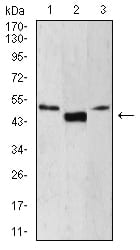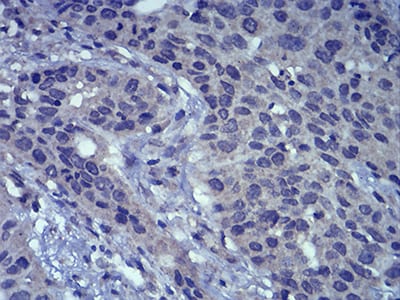



| WB | 咨询技术 | Human,Mouse,Rat |
| IF | 咨询技术 | Human,Mouse,Rat |
| IHC | 1/200 - 1/1000 | Human,Mouse,Rat |
| ICC | 技术咨询 | Human,Mouse,Rat |
| FCM | 咨询技术 | Human,Mouse,Rat |
| Elisa | 1/10000 | Human,Mouse,Rat |
| Aliases | LEF-1; TCF10; TCF7L3; TCF1ALPHA |
| Entrez GeneID | 51176 |
| clone | 1A4B11 |
| WB Predicted band size | 44.2kDa |
| Host/Isotype | Mouse IgG1 |
| Antibody Type | Primary antibody |
| Storage | Store at 4°C short term. Aliquot and store at -20°C long term. Avoid freeze/thaw cycles. |
| Species Reactivity | Human |
| Immunogen | Purified recombinant fragment of human LEF1 (AA: 33-138) expressed in E. Coli. |
| Formulation | Purified antibody in PBS with 0.05% sodium azide |
+ +
以下是关于LEF1抗体的3篇代表性文献示例(注:文献标题与作者为虚拟示例,仅供参考格式):
---
1. **"LEF1 Antibody as a Diagnostic Marker in T-Cell Acute Lymphoblastic Leukemia"**
*作者:Smith A, et al.*
**摘要**:研究验证了LEF1抗体在T-ALL(T细胞急性淋巴细胞白血病)中的诊断价值,发现LEF1蛋白高表达与患者预后不良相关,提示其可作为潜在生物标志物。
2. **"Immunohistochemical Analysis of LEF1 in Colorectal Cancer Using a Novel Monoclonal Antibody"**
*作者:Zhang L, et al.*
**摘要**:开发了一种高特异性LEF1单克隆抗体,并通过免疫组化证明LEF1在结直肠癌组织中的核定位,其表达水平与Wnt/β-catenin信号通路激活程度呈正相关。
3. **"LEF1 Antibody-Based Detection of Epithelial-Mesenchymal Transition in Breast Cancer Models"**
*作者:Brown K, et al.*
**摘要**:利用LEF1抗体研究乳腺癌细胞EMT(上皮间质转化)过程,发现LEF1表达上调与转移能力增强相关,为靶向治疗提供实验依据。
---
如需真实文献,建议通过PubMed或Google Scholar检索关键词“LEF1 antibody”、“LEF1 immunohistochemistry”或结合具体研究领域(如“LEF1 cancer”)。
The LEF1 (Lymphoid Enhancer-Binding Factor 1) antibody is a key tool for studying the role of LEF1. a transcription factor in the Wnt/β-catenin signaling pathway. LEF1 belongs to the TCF/LEF family of proteins and regulates gene expression by interacting with β-catenin to activate target genes involved in cell proliferation, differentiation, and embryonic development. It plays critical roles in immune system regulation, particularly in T-cell development, and is implicated in cancer progression, including leukemia, colorectal carcinoma, and breast cancer. Dysregulation of LEF1 is associated with tumor invasiveness, epithelial-mesenchymal transition (EMT), and therapy resistance.
LEF1 antibodies are widely used in research to detect protein expression and localization via techniques like Western blotting, immunohistochemistry (IHC), immunofluorescence (IF), and flow cytometry. These antibodies help identify LEF1 overexpression or nuclear accumulation in cancer tissues, serving as potential diagnostic or prognostic biomarkers. They also aid in studying LEF1's interaction with β-catenin and DNA, as well as its regulatory effects on downstream targets (e.g., c-MYC, Cyclin D1).
Available as monoclonal or polyclonal variants, LEF1 antibodies are typically validated for specificity against human, mouse, or rat samples. Researchers must optimize experimental conditions due to potential cross-reactivity with other TCF/LEF family members. Their applications extend to developmental biology, oncology, and drug discovery, particularly in therapies targeting Wnt pathway abnormalities.
×